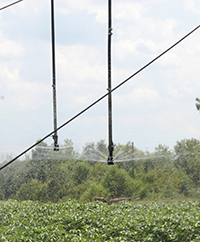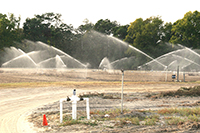To avoid disaster due to subfreezing winter temperatures, leaky pipes and uninvited rodents, University of Georgia Cooperative Extension irrigation specialist Wes Porter recommends that Georgia growers inspect their irrigation systems before planting their crops this spring.
“We’ve got to get our irrigation systems in top shape, up and ready to run. Once the crops are up, the last thing you want is an irrigation system to break down,” Porter said.
Planting season is just weeks away for Georgia corn growers, who normally start planting at the beginning of March. Now is the best time to inspect irrigation equipment, Porter said.
“I encourage (growers) to do a quick search online or go to their county (Extension) office and ask for our spring center-pivot checklist,” he said. “It goes through the components (that growers) should check very thoroughly, has detailed pictures of the critical areas to check, discusses what to look for and even how to correct most of the problems.”
The center-pivot maintenance guide can be found online in UGA Extension Bulletin 1452, located at extension.uga.edu/publications/detail.html?number=B1452.
After farmers begin planting their crops, they may apply irrigation to establish proper plant stands or activate herbicides, and a leaky pipe or flat tire can delay those plans.
“If farmers take care of these maintenance procedures before the growing season begins, it will save them much-needed time during critical water-use periods and prevent potential yield loss to their crops due to moisture stress,” Porter said.
Growers should test irrigation systems and let them run to make sure they are operating efficiently prior to their initial use on this season’s crops, he said.
“Start the system up and make sure it’s working with proper operating pressure. It’s a good idea to check the flow rate to make sure (it’s) where it is supposed to be. You can also visually check all the nozzles to ensure they’re all working properly,” Porter said.
Growers should also make sure that sprinklers are rotating properly, in a uniform pattern.
Change the oil and clean the air filters on motors that run on diesel, gas or propane. Make sure that pumps are ready and free of overwintering animals or insects, their nests and cobwebs.
UGA Extension water educators can come to growers’ fields to take uniformity tests. Through these tests, they can check water distribution across a pivot and find where growers can potentially save money.
To learn more about UGA Extension water educators, visit http://bit.ly/2BHrncS.







.png)
